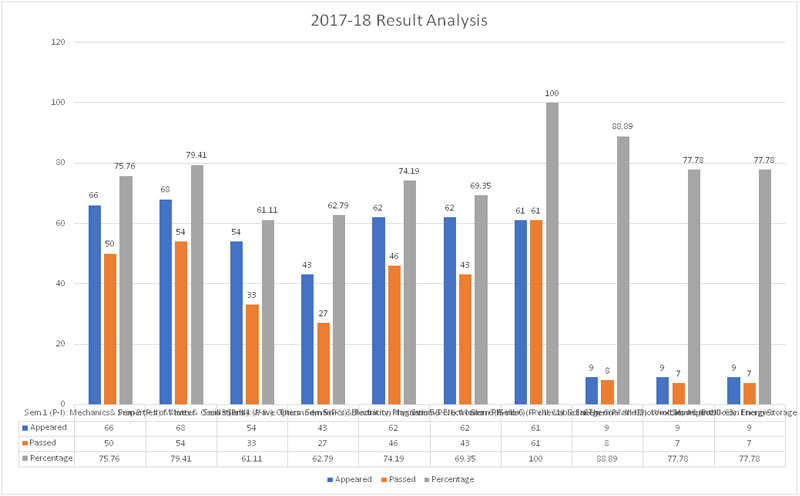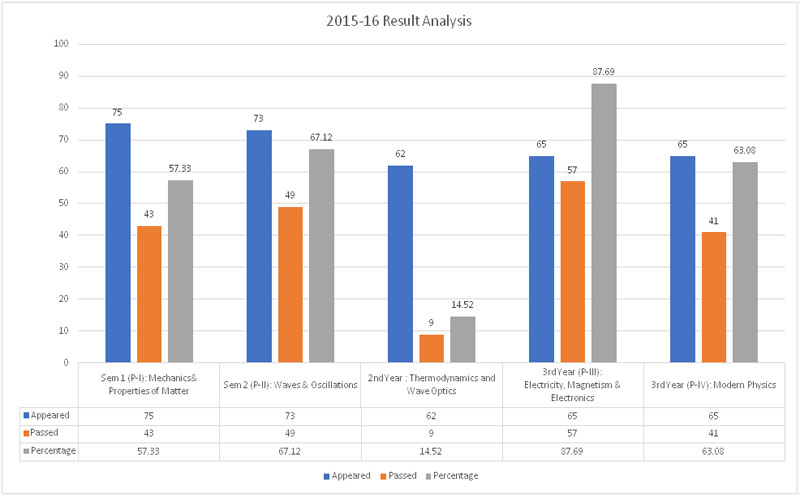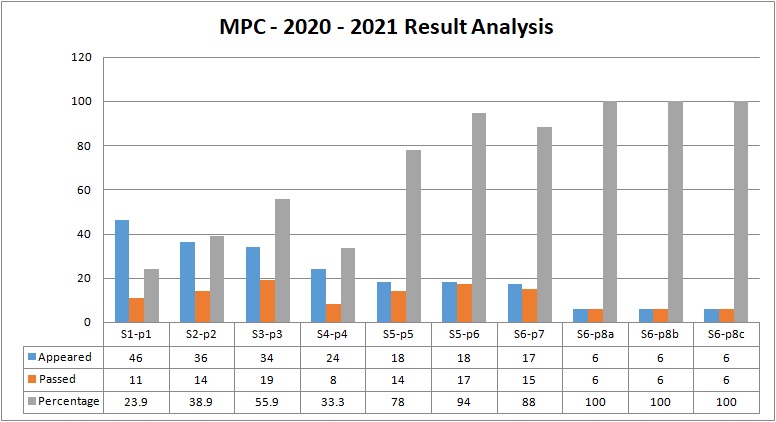
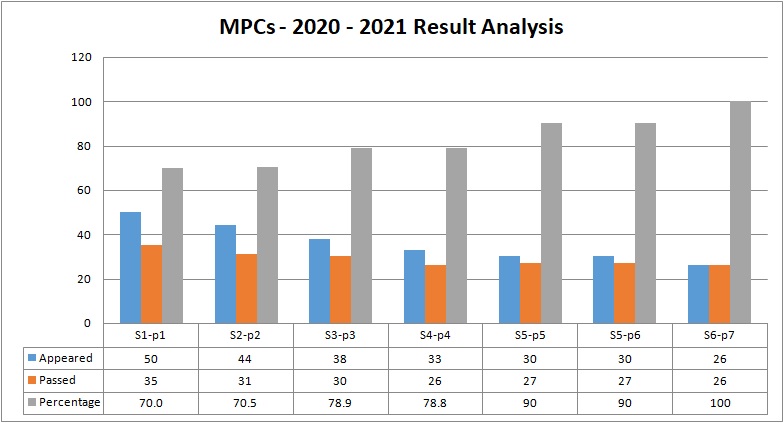
The Department of Physics was established in the academic year 1995-96 with Mathematics and Chemistry as allied combination. Later the combination of Mathematics, Physics and Computer Science was sanctioned in the academic year 2001-02. The medium of instruction for Mathematics, Physics and Chemistry combination is Telugu while for Mathematics, Physics and Computer Science combination is English The intake capacity of the students for M.P.C is 30(Thirty) and intake capacity of the students for M.P.Cs is 30( Thirty).Every year ten extra seats were sanctioned for M.P.C and ten seats for M.P.Cs. From the academic year 2019-20 the intake capacity of the students for M.P.C is 50(Fifty) and intake capacity of the students for M.P.Cs is 50( Fifty).Three posts were sanctioned to Physics Department.
The department is conducting assignments, student seminars, quiz programs and internal examinations to assess the progress of the students. The Department is providing study material for better results and also conducting remedial coaching and for the slow learners.
The department encourages as well as guides the students to build up their career. Additional reading material is available in the department for the students preparing for entrance tests for Higher education.
We encourages the students to go library refer articles and journals related to Physics and competitive examinations.
S.No |
Name |
Designation |
Qualification |
Photo |
Curricullum Vitae |
| 01 | Sri. A. Koteswara Rao | Assistant Professor | M.Sc. , B.Ed. | View CV | |
| 02 | Sri. Duddu Sampurana Rao | Assistant Professor | M.Sc. | 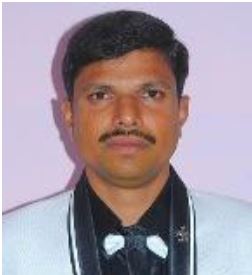 |
View CV |
| 02 | Sri. SK. Sattar | Assistant Professor | M.Sc. | 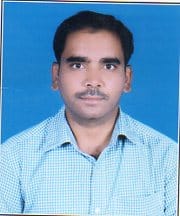 |
View CV |
S.No |
Name |
Designation |
Qualification |
|---|---|---|---|
| 01 | M. Sarala | Store Keeper | Intermediate |
S.No |
Year of Starting |
Title of the Program |
LEVEL (UG, PG) |
Duration (Years) |
Sanctioned Annual Intake |
|
1 |
1995 |
B.Sc (Mathematics, Physics, Chemistry) |
UG |
3 |
50 |
|
2 |
1995 |
B.Sc (Mathematics, Physics, Computer Science) |
UG |
3 |
50 |
|
Academic year : 2019- 2020
Semester : I Sem
Class : I B.Sc, MPC & MPCS
Subject : Mechanics &Properties of Matter
Course Objectives :
This course would enhance the basic knowledge and skills regarding principles involved in Mechanics which helps the students in their daily life. This syllabus will provide the basic requirements for their higher studies. This course will provide a theoretical basis for doing experiments in related areas.
Course Out comes :
1. Learner will understand basic theorems and concepts of basic physics.
2. To understand the elastic properties of matter and expression of bending beam with its application as a cantilever.
3. Understand the effect of gravition on objects and principle of rocket.
4. Analyze the relativistic effects using special theory of relativity.
Academic year : 2019- 2020
Semester : II Sem
Class : I B.Sc, MPC & MPCS
Subject : Waves & Oscillations
Course Objectives :
This course would enable the students to understand the concepts of simple harmonic motion and acquire basic knowledge regarding the Ultrasonic Waves which helps the students in their daily life. This syllabus will provide the basic requirements for their higher studies. This course will provide a theoretical basis for doing experiments in related areas.
Course Out comes :
1. Learn the motion of simple harmonic oscillator including damped and forced oscillator.
2. The student can describe the production and detection of ultrasonic waves . He understand the applications of ultrasonics.
3. The learner can verify the laws of vibrations in a stretched string.
4. Determine the unknown frequency of a tuning fork in the laboratory in melde’s experiment and volume resonator experiment.
5. Determine the acceleration due to gravity in the laboratory using simple pendulum and torsional pendulum.
Academic year : 2019- 2020
Semester : III Sem
Class : II B.Sc MPC & MPCS
Subject : Wave Optics
Course Objectives :
This course would enable the students to understand the concepts of Abberations , Interference , Diffraction, Polarisation and Lasers, optical fibres which helps the students in their daily life. This syllabus will provide the basic requirements for their higher studies. This course will provide a theoretical basis for doing experiments in related areas.
Course Out comes :
1. Distinguish different types of aberrations and can describe the methods for their elimination.
2. Determine the wave length of light using interference and diffraction patterns.
3. Analyze different types of polarised light.
4. Determine the dispersive power of a prism.
5. Explain the principle of LASER and applications of Lasers.
Academic year : 2019- 2020
Semester : IV Sem
Class : II B.Sc MPC & MPCS
Subject : Thermodynmics & Radiation Physics
Course Objectives :
This course would enable the students to understand the concepts of heat and temperature, heat transnfer, entropy, production of low temperature, liquification of gases and thermal radiation which helps the students in their daily life. This syllabus will provide the basic requirements for their higher studies. This course will provide a theoretical basis for doing experiments in related areas.
Course Out comes :
1.The learner can define the postulates of kinetic theory of gases and can explain transport phenomena in gases.
2.Understand different thermal processes, and deduce the equation for the efficiency of a carnot’s heat engine.
3. Determine the thermal efficiency of an electrical kettle Analyze different types of polarised light.
4.Describe the principles in the production of low temperature.
5. Distinguish between the laws of thermal radiation.
6. Measure the thermal conductivity of rubber in the laboratory.
Academic year :2019- 2020
Semester : V Sem
Class : III B.Sc MPC & MPCS
Subject : Electricity, Magnetism & Electronics
Course Objectives :
This course would enable the students to understand the concepts of Electricity, Magnetism, dielectrics, electromagnetism, A.C circuits, basic electronics and digital electronics which helps the students in their daily life. This syllabus will provide the basic requirements for their higher studies. This course will provide a theoretical basis for doing experiments in related areas.
Course Out comes :
1.The learner can deduce the expressions for electric field intensity and electric potential.
2. Calculate the magnetic field intensity due to a straight current carrying conductor, a circular coil and a solenoid.
3. Determine the Q factor for LCR series/parallel resonant circuits.
4.Study the characteristics of PN junction diode, Zener diode and transistor.
5. Verify the truth tables of basic logic gates, half adder and full adder.
6. verify the de-morgan’s theorems in digital electronics.
Academic year : 2019- 2020
Semester : V Sem
Class : III B.Sc MPC & MPCS
Subject : Modern Physics
Course Objectives :
This course would enable the students to understand the concepts of Atomic & Molecular Physics, Matter waves, Uncertainity Priniciple, Quantum Mechanics, Nuclear properties, crystal structure and super conductivity which helps the students in their daily life. This syllabus will provide the basic requirements for their higher studies. This course will provide a theoretical basis for doing experiments in related areas.
Course Out comes :
1.The learner can describe Quantum numbers, Raman effect.
2. Explain the dual nature of mater and Heisenbergs uncertainity principle.
3. Deduce the Schrodinger wave equations and can solve problem of particle in a one dimensional box.
4. Explain the prescribed nuclear models.
5. Describe the X-ray diffraction experimental techniques in the study of crystal structure.
6.Mention the applications of Super conductivity.
7. Measure the energy gap of a semi conductor using PN junction diode and thermistor.
Academic year : 2019- 2020
Semester : VI Sem
Class : III B.Sc – MPC & MPCS
Subject : Renewable Energy (Elective)
Course Objectives :
This course would enable the students to understand the concepts of energy, conventional and non conventional energy sources, environmental effects of production and utilisation of different forms of energy, energy consumption across the globe with a focus on India, solar, wind, ocean, hydrogen and bio energies which helps the students in their daily life. This syllabus will provide the basic requirements for their higher studies.
This course will provide a theoretical basis for doing experiments in related areas.
Course Out comes :
1.The learner will be able to describe the environmental aspects of non-conventional energy sources, in comparision with various conventional energy sources.
2. Tell the need of renewable energy sources.
3. Describe the use of solar energy in various applications like solar heating, cooling, desalination, dying, cooking and power generation.
4. Explain the applications of wind energy using wind turbines.
5. Describe the advantages and disadvantages of Ocean energy.
6. Explain the applications of Bio gas plants.
Academic year :2019- 2020
Semester : VI Sem
Class : III B.Sc – MPC & MPCS
Subject : Solar Thermal & Photovoltaic Aspects (Cluster-C1)
Course Objectives :
This course would enable the students to understand the concepts of spectral distribution of solar energy, Solar thermal collectors, solar cells, solar modules, solar arrays, and solar PV systems,solar thermal applications and solar pv applications which helps the students in their daily life. This syllabus will provide the basic requirements for their higher studies. This course will provide a theoretical basis for doing experiments in related areas.
Course Out comes :
1.The learner will be able to describe the solar intensity measurement using Angstrom’s Pyrheliometer.
2. Describe the construction, working and efficiencies of different solar collectors.
3. Explain the efficiency , fill factor of a solar cell.
4. Analyze the working of Solar PV system.
5. Differntiate various thermal applications of solar energy like solar heaters, coolers, dyers, desalinators, cookers, power generators.
Academic year :2019- 2020
Semester : VI Sem
Class : III B.Sc – MPC & MPCS
Subject : Wind, Hydro and Ocean energies (Cluster-C2)
Course Objectives :
This course would enable the students to understand the concepts of wind energy conversion systems, design of wind turbine, wind energy applications, small hydro power systems, ocean thermal, tidal and wave energy systems which helps the students in their daily life. This syllabus will provide the basic requirements for their higher studies. This course will provide a theoretical basis for doing experiments in related areas.
Course Out comes :
1. The student can Identify Winds energy as alternate form of energy and to know how it can be tapped .
2. Understand the Ocean thermal, Wave &Tidal energy, its mechanism of production and its applications
3.Distinguish the micro, mini and small hydro power systems.
Academic year :2019- 2020
Semester : VI Sem
Class : III B.Sc – MPC & MPCS
Subject : Energy Storage devices (Cluster-C3)
Course Objectives :
This course would enable the students to understand the concepts of principles involved in Primary and secondary batteries, super conducting magnetic energy storage systems, Fuel cells, which helps the students in their daily life. This syllabus will provide the basic requirements for their higher studies. This course will provide a theoretical basis for doing experiments in related areas.
Course Out comes :
1. The student can able to differentiate the primary, secondary batteries.
2. Explain the various applications of SMES systems, and their performance.
3. Discuss the construction and working principle of Fuel Cell and differentiate the different types of fuel cells.
4. Describe the various applications of Fuel Cells.
Academic year :2019- 2020
Semester : II Sem
Class : I B.Sc – MPC & MPCS
Subject : Waves & Oscillations
Course Objectives :
This course would enable the students to understand the concepts of simple harmonic motion and acquire basic knowledge regarding the Ultrasonic Waves which helps the students in their daily life. This syllabus will provide the basic requirements for their higher studies. This course will provide a theoretical basis for doing experiments in related areas.
Course Out comes :
1. Learn the motion of simple harmonic oscillator including damped and forced oscillator.
2. The student can describe the production and detection of ultrasonic waves . He understand the applications of ultrasonics.
3. The learner can verify the laws of vibrations in a stretched string.
4. Determine the unknown frequency of a tuning fork in the laboratory in melde’s experiment and volume resonator experiment.
5. Determine the acceleration due to gravity in the laboratory using simple pendulum and torsional pendulum.
Academic year :2019- 2020
Semester : III Sem
Class : II B.Sc – MPC & MPCS
Subject : Wave Optics
Course Objectives :
This course would enable the students to understand the concepts of Abberations , Interference , Diffraction, Polarisation and Lasers, optical fibres which helps the students in their daily life. This syllabus will provide the basic requirements for their higher studies. This course will provide a theoretical basis for doing experiments in related areas.
Course Out comes :
1. Distinguish different types of aberrations and can describe the methods for their elimination.
2. Determine the wave length of light using interference and diffraction patterns.
3. Analyze different types of polarised light.
4. Determine the dispersive power of a prism.
5. Explain the principle of LASER and applications of Lasers.
Academic year :2019- 2020
Semester : IV Sem
Class : II B.Sc – MPC & MPCS
Subject : Thermodynmics & Radiation Physics
Course Objectives :
This course would enable the students to understand the concepts of heat and temperature, heat transnfer, entropy, production of low temperature, liquification of gases and thermal radiation which helps the students in their daily life. This syllabus will provide the basic requirements for their higher studies. This course will provide a theoretical basis for doing experiments in related areas.
Course Out comes :
1.The learner can define the postulates of kinetic theory of gases and can explain transport phenomena in gases.
2.Understand different thermal processes, and deduce the equation for the efficiency of a carnot’s heat engine.
3. Determine the thermal efficiency of an electrical kettle Analyze different types of polarised light.
4.Describe the principles in the production of low temperature.
5. Distinguish between the laws of thermal radiation.
6. Measure the thermal conductivity of rubber in the laboratory.
Academic year :2019- 2020
Semester : V Sem
Class : III B.Sc – MPC & MPCS
Subject : Electricity, Magnetism & Electronics
Course Objectives :
This course would enable the students to understand the concepts of Electricity, Magnetism, dielectrics, electromagnetism, A.C circuits, basic electronics and digital electronics which helps the students in their daily life. This syllabus will provide the basic requirements for their higher studies. This course will provide a theoretical basis for doing experiments in related areas.
Course Out comes :
1.The learner can deduce the expressions for electric field intensity and electric potential
2. Calculate the magnetic field intensity due to a straight current carrying conductor, a circular coil and a solenoid.
3. Determine the Q factor for LCR series/parallel resonant circuits
4.Study the characteristics of PN junction diode, Zener diode and transistor.
5. Verify the truth tables of basic logic gates, half adder and full adder.
6. verify the de-morgan’s theorems in digital electronics.
Academic year :2019- 2020
Semester : V Sem
Class : III B.Sc – MPC & MPCS
Subject : Modern Physics
Course Objectives :
This course would enable the students to understand the concepts of Atomic & Molecular Physics, Matter waves, Uncertainity Priniciple, Quantum Mechanics, Nuclear properties, crystal structure and super conductivity which helps the students in their daily life. This syllabus will provide the basic requirements for their higher studies. This course will provide a theoretical basis for doing experiments in related areas.
Course Out comes :
1.The learner can describe Quantum numbers, Raman effect.
2. Explain the dual nature of mater and Heisenberg’s uncertainity principle.
3. Deduce the Schrodinger wave equations and can solve problem of particle in a one dimensional box.
4. Explain the prescribed nuclear models.
5. Describe the X-ray diffraction experimental techniques in the study of crystal structure.
6.Mention the applications of Super conductivity.
7. Measure the energy gap of a semi conductor using PN junction diode and thermistor.
Academic year :2019- 2020
Semester : VI Sem
Class : III B.Sc – MPC & MPCS
Subject : Renewable Energy (Elective)
Course Objectives :
This course would enable the students to understand the concepts of energy, conventional and non conventional energy sources, environmental effects of production and utilisation of different forms of energy, energy consumption across the globe with a focus on India, solar, wind, ocean, hydrogen and bio energies which helps the students in their daily life. This syllabus will provide the basic requirements for their higher studies. This course will provide a theoretical basis for doing experiments in related areas.
Course Out comes :
1.The learner will be able to describe the environmental aspects of non-conventional energy sources, in comparision with various conventional energy sources.
2. Tell the need of renewable energy sources.
3. Describe the use of solar energy in various applications like solar heating, cooling, desalination, dying, cooking and power generation.
4. Explain the applications of wind energy using wind turbines.
5. Describe the advantages and disadvantages of Ocean energy.
6. Explain the applications of Bio gas plants.
Academic year :2019- 2020
Semester : VI Sem
Class : III B.Sc – MPC & MPC
Subject : Solar Thermal & Photovoltaic Aspects (Cluster-C1)
Course Objectives :
This course would enable the students to understand the concepts of spectral distribution of solar energy, Solar thermal collectors, solar cells, solar modules, solar arrays, and solar PV systems,solar thermal applications and solar pv applications which helps the students in their daily life. This syllabus will provide the basic requirements for their higher studies. This course will provide a theoretical basis for doing experiments in related areas.
Course Out comes :
1.The learner will be able to describe the solar intensity measurement using Angstrom’s Pyrheliometer.
2. Describe the construction, working and efficiencies of different solar collectors.
3. Explain the efficiency , fill factor of a solar cell.
4. Analyze the working of Solar PV system.
5. Differntiate various thermal applications of solar energy like solar heaters, coolers, dyers, desalinators, cookers, power generators.
Academic year :2019- 2020
Semester : VI Sem
Class : III B.Sc – MPC & MPCS
Subject : Wind, Hydro and Ocean energies (Cluster-C2)
Course Objectives :
This course would enable the students to understand the concepts of wind energy conversion systems, design of wind turbine, wind energy applications, small hydro power systems, ocean thermal, tidal and wave energy systems which helps the students in their daily life. This syllabus will provide the basic requirements for their higher studies. This course will provide a theoretical basis for doing experiments in related areas.
Course Out comes :
1. The student can Identify Winds energy as alternate form of energy and to know how it can be tapped
2. Understand the Ocean thermal, Wave &Tidal energy, its mechanism of production and its applications
3.Distinguish the micro, mini and small hydro power systems.
Academic year :2019- 2020
Semester : VI Sem
Class : III B.Sc – MPC & MPCS
Subject : Energy Storage devices (Cluster-C3)
Course Objectives :
This course would enable the students to understand the concepts of principles involved in Primary and secondary batteries, super conducting magnetic energy storage systems, Fuel cells, which helps the students in their daily life. This syllabus will provide the basic requirements for their higher studies. This course will provide a theoretical basis for doing experiments in related areas.
Course Out comes :
1. The student can able to differentiate the primary, secondary batteries
2. Explain the various applications of SMES systems, and their performance.
3. Discuss the construction and working principle of Fuel Cell and differentiate the different types of fuel cells.
4. Describe the various applications of Fuel Cells.
PSO1: Improve their academic abilities, personal qualities and there by behave as responsible citizens and define the basic laws involved in Physics.
PSO2: Understand the concepts and significance of the various physical phenomena and carry out experiments to understand the laws and concepts of Physics.
PSO3: Apply the skills acquired to solve daily life problems.
PSO4: Acquire a wide range of problem solving skills, both analytical and computational and to apply them.
PSO5: Acquire analytical and logical skill for higher Education.
PSO6: Take up jobs in the subject related areas and be confident to take up competitive exams.
| Seminars |  |
Quizzes |  |
|
| Assignments |  |
Remedial Classes |  |
|
| Group Discussions |  |
| Assignments |  |
Seminars |  |
|
| Group Discussions |  |
Remedial Classes |  |
|
| Quizzes |  |
Extension Lectures |  |
| S.No | Date | Conducted By | Name of The Activity | Details of Resource Person | No of Participants | Report |
|---|---|---|---|---|---|---|
| 01 | 10-12-2021 | Physics | Guest Lecture | Dr. V. Prasad, Lecturer in Physics KRK GDC, Addanki |
37 | Click Here |
| 02 | 14-12-2021 | Physics | Energy Conversation Day | P. Edukondalu, A.E.E. APCPDCL,Repalle |
71 | Click Here |
| 03 | 10-02-2022 | Physics | Awareness Program on Health and Hygiene at Uppudi village |
Students | 51 | Click Here |
| 04 | 15-02-2022 to 17-02-2022 |
Physics | Student Exchange Programme | Government Degree College for Women, Bapatla |
15 | Click Here |
| 05 | 30-12-2021 to 18-02-2022 |
Physics | Certificate Course on "Synthesis on Charecterization of Nano Materials" |
Physics Faculty | 30 | Click Here |
| Remedial Classes |  |
Seminars |  |
|
| Assignments |  |
Quizzes |  |
|
| Group Discussions |  |
| Remedial Classes |  |
Seminars |  |
|
| Assignments |  |
Quizzes |  |
|
| Group Discussions |  |
| Remedial Classes |  |
Seminars |  |
|
| Assignments |  |
Quizzes |  |
|
| Group Discussions |  |
| Remedial Classes |  |
Seminars |  |
|
| Assignments |  |
Quizzes |  |
|
| Group Discussions |  |



